





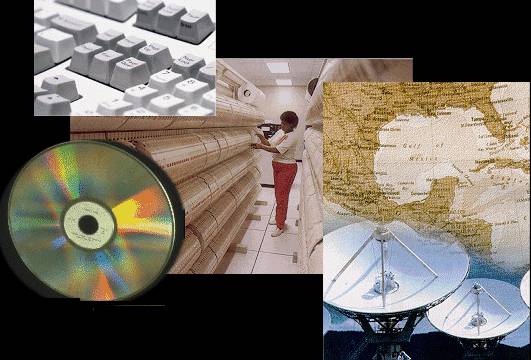
Medical Literature Retrieval on the Internet
Continued Education Course on Internet and Medicine [2]
One of the greatest benefits of Internet for the physician is the possibility of carrying out medical literature searches using the World Wide Web. Learn more in this article about the best sites do to it and how to access them.
[ Accessing MEDLINE | Accessing the Original Publications | Services for Alerting, Abstracting and News | To Know More | The Author ]
T he rapid and up-to-date access to scientific
publications is of essential importance to medical practicioners, students
and researchers alike. Traditional publications, such as periodicals, conference
proceedings and books have been, until now, the main form for disseminating
knowledge. They represent an enormous accumulated volume of information.
This makes the task of following medical progress a hard one for the physician,
even in his/her own subspecialty. The US National
Library of Medicine, the largest medical library in the world,
estimates that the volume of published information in the health sciences
may be doubling every four years !.
Well since the last century, many auxiliary resources were devised to facilitate the search for specific medical papers. Almost everyone in the field is aware of Index Medicus, a century-old index or catalog of the main medical publications in the world, which is compiled and published every month by the National Library of Medicine. Its database, called MEDLINE, is the basis of one of the main computerized secondary sources for performing literature searches. Covering all articles published in the last three decades (more than nine million individual items), MEDLINE has been made available via CD-ROMs and computer networks and has revolutionized as well popularized computer-based access to medical literature. Although the printed form of Index Medicus continues to be produced and sold, is hard to imagine anyone having the nerve to go manually through the increasingly heavy tomes that constitute it, in order to find references.
Although the CD-ROM is a very compact medium to store such information and it is easy to use, on-line access has many advantages over it. The database is always kept up-to-date with the latest references, all the years of MEDLINE are contained into a single search file, and it use is now free of charge. For the occasional and individual user, CD-ROM is simply no longer cost-effective, unless you don't have access to Internet.
Until 1996, on-line access was possible only through dedicated computer lines, such as the MEDLARS system (or. in other regions, such as in Latin America and the Caribbean, to local redistribution systems, like BIREME, the Regional Library of Medicine, located in São Paulo, Brazil). Nowadays, although this system is still available, the best way to access MEDLINE is through Internet and the World Wide Web (WWW) using any generic browser software, such as Netscape or Internet Explorer. The best of all is that its use is now free of charge. Many second-source providers of access to MEDLINE also facilitate the acquisition of the original reprints via on-line forms.
Since many medical journals are also being offered in full-text versions via the Internet, in the future it will be increasingly easier to locate the original papers, which will be linked to the results of your search. Presently only a few of these journals are linked to some MEDLINE databases, byt the trend is clear. Anyway, in case you want to search for the on-line full-text papers which are available on the Internet, you can use generic search engines such as Altavista (http://www.altavista.digital.com), HotBot (http://www.hotbor.com/), etc. (please see "Searching for Medical Information on the Internet", in Intermedic's issue no. 1). In order to facilitate the life of any physician who wishes to remain well informed on the latest konwledge, there are already many sites and services on the Internet which provide medical news and updates, as well as "journal clubs", where important papers are presented and reviewed.
 Accessing
Medline
Accessing
Medline Doing a literature search on the Internet is very simple and easy. First you must enter one of the WWW addresses we give below into your favorite browser program. You will access a so-called "search page", which has a small box where you can enter the search terms, or keywords, you want to use for a particular search. Each site uses a slightly different form and layout to specify searches. Some of them offer a "quick search", with very few options, as well as a more elaborate search page, which may use a number of more sophisticated options, such as specifying searches by author name, title words, year, idiom, or by using logical expressions such as AND, OR, NOT, etc.
The original MEDLINE database resides in a new access mechanism called PubMed (http://www.ncbi.nlm.nih.gov/PubMed), which was developed by the National Center for Biotechnology Information (NCBI). It is entirely free of charge and it is also one of the best search engines around, consistently turning out precise results, regardless of the user's experience with literature searches. It uses advanced concepts of similarity between papers. which are very efficient and useful. An example of this power is the existence of a link for each retrieved paper, titled "See Related Articles". Clicking on it calls up a refined search with optimal results, in our opinion. On the minus side, PubMed so far does not allow for requesting reprints of the article (but it already has some on-line journals linked to the references).
See below a typical series of the steps which are required for a PubMed search and retrieval
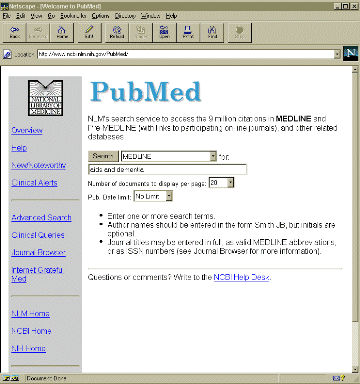 The
starting screen shows a simplified (quick) search box. Any number of appropriate
keywords using natural language may be entered into it. Options for the
search include the selection of the database where the search will be performed,
the maximum number of itens per screen of results, and a limitation for
the publication dates.
The
starting screen shows a simplified (quick) search box. Any number of appropriate
keywords using natural language may be entered into it. Options for the
search include the selection of the database where the search will be performed,
the maximum number of itens per screen of results, and a limitation for
the publication dates.
Click on the image to see a
larger version
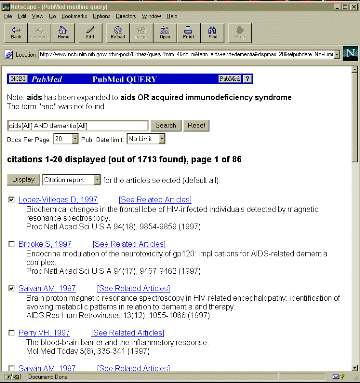 Upon
clicking on the "search" button, the NCBI server performs a search
on the database and produces a screen containing a list of the papers which
satisfy the search criteria. Each paper is presented with two hyperlinks: one
to the paper's abstract, and another one to perform a search for related
articles to that one. Furthermore, you can click on the small checkboxes
at the left, in order to select a number of papers you wish to retrieve
in the same set.
Upon
clicking on the "search" button, the NCBI server performs a search
on the database and produces a screen containing a list of the papers which
satisfy the search criteria. Each paper is presented with two hyperlinks: one
to the paper's abstract, and another one to perform a search for related
articles to that one. Furthermore, you can click on the small checkboxes
at the left, in order to select a number of papers you wish to retrieve
in the same set.
Click on the image for a
larger version
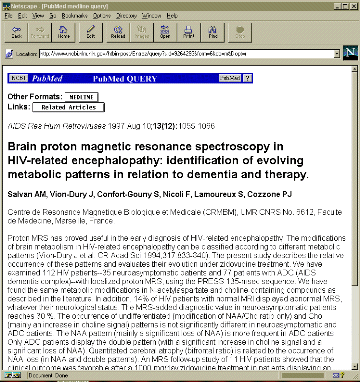
The selected abstracts are now displayed onto the next screen. There are choices in the last rows of the screen which allow for saving the results in a format for Windows or Macintosh computers onto your local hard disk.
Click on the image for a
larger version
Another way of searching the MEDLINE has also been provided by the National Library of Medicine: it is a software and now a WWW search interface called Grateful Med. This was designed to make easy on-line literature retrieval for physicians and other health professionals and students who want to have the maximum flexibility of search parameters with minimum investment in learning how to do it. Grateful Med is freely available through the NLM, at the Internet address: http://www.nlm.nih.gov
In other countries than the USA, there are regional or local copies of the MEDLINE database, with its own WWW access screens. Such is the case of BIREME (http://www.bireme.br), the Regional Center for Health Information for Latin America and the Caribbean. As an example, in this site access is provided only for registered subscribers, who must use a password, and the cost is 7 cents per retrieved reference. A specialized literature database called LILACS (Latin American Literature in Health Sciences) contains several thousands of papers which were published in periodicals of the region, but which are not available in the MEDLINE database. LILACS can be very useful, for instance, for public health researchers or physicians who are interested in particular diseases or health care data specific to the region. BIREME also gives on-line access to the thesaurus of search terms (MeSH, or Medical Subject Headings) used to index the papers, as well as to a reprint request system, which is relatively inexpensive, compared to commercial systems such as HealthGate (US$ 3 per paper with up to 10 pages and US$ 2 per additional page). A subscriber's account system named BITNICS is also available, so that on-line payments can be made. Recently BIREME has announced that it will also offers free-of-charge access to its literature retrieval services.
There are many other Internet-based services which offer general or specialized access to their own implementations of MEDLINE search engines. One the best kwnon is Healthgate (http://www.healthgate.com/HealthGate/MEDLINE/search.shtml ), an American company devoted to on-line health information to professionals and patients. Access is free of charge, and it has the advantage of providing selective use of specialized databases, such as AIDSLINE, ONCOLINE, etc.. The search mechanism has many options in the advanced mode. It allows also for on-line requests of article reprints, but they are very expensive (typically a US$ 30 charge per article).
Another interesting service is MedScape (http://www.medscape.com/), one of the premier medical information sites in the world. It offers a good search mechanism to MEDLINE, AIDSLINE, TOXLINE, and other databases, which is free of charge for previously registered users (who must get their own passwords first). MedScape has also a first rate archive of medical papers, and is starting to provide links from the search directly to some on-line journals or to the papers published under the own MedScape's banner.
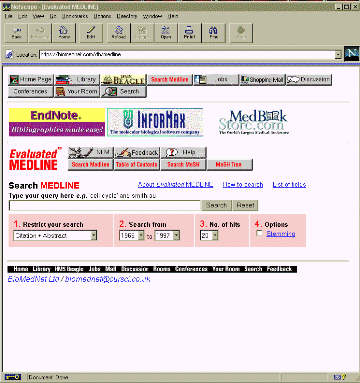
BioMedNet is a WWW-based service which offers a differentiated service named Evaluated MED-LINE (http://biomednet.com/db/medline). This means that, besides providing conventional screen listings as a result of selective searches, it may retrieve reviews of some articles, written by specialists, as well as htyperlinks to the full-text articles, when they exist. From these, there are also reverse links to MEDLINE records.
There many other MEDLINE search services available on the Internet. An excellent list and a comparative table is provide by Medical Matrix (http://www.medmatrix. org/index.asp). Another good index is MedWeb's MEDLINE links (http://www.gen.emory.edu/MEDWEB/keyword/medline.html).
 Accessing
the Original Publications
Accessing
the Original Publications What you should do after you have found the references ? As we have explained above, there are several alternatives: you may want to go to the library and locate the particular issues of the printed journals where the articles have been published, or you may wish to request photocopies via the library lending services. Many university libraries provide those services and their holdings may be also searched via the Internet, so that you will be able to determine whether they have the issues at hand. You may find a list of all on-line libraries at the site . Another alternative is to buy the reprints from a express service, such as UnCoverWeb (http://uncweb. carl.org/), but please be advised that these are usually very expensive, in direct proportion to your urgency.
Fortunately, the number of on-line journals which provide access to the full text of their articles is ever increasing and probably this is going to be an universal way of reading scientific literature. There are a few catalogs of scientific, technical and medical publications you can use to locate the available journals, such as the WWW Virtual Library, Electronic Journals (ejournal), which contains an extensive database (WILMA) of peer-reviewed and non-peer-reviewed on-line serials. The address is http://www.edoc.com. MedWeb Electronic Journals (http://www.cc.emory.edu/WHSCL/medweb.html), developed by Emory University, Atlanta, USA, is considered one of the most complete on-line catalogs of electronic journals in medicine and health. The catalog is subdivided according to specialty or field of interest, which facilitates browsing; and has also a search engine.
In case you are interested in a complete list of all Brazilian electronic journals, magazines and newsletters available on the Internet please consult our Brazilian Catalog of Internet Resources in Medicine. The e*pub Group of Electronic Publications, of the Center for Biomedical Informatics of the State University of Campinas is the largest publishing venture in Brazil in the area of health care and medicine, and it is helping out publishing houses and medical societies to put their publications on-line. A similar alternative in the USA is HighWire Press (http://highwire.stanford.edu), by the University of Stanford.
 Alerting,
Abstracting and News Services
Alerting,
Abstracting and News ServicesDue to the large number of WWW sites containing medical publications, it is an increasingly time consuming task to visit all the interesting sites. The best solution is to visit those sites which provide on-line lists of recent publications. One of the best is WebMedLit (http://www.webmedlit.com/), which covers 18 of the most important medical journals, categorized into specialty area (presently they are: virology and AIDS, cardiology, oncology, dermatology, diabetes, gastroenterology, immunology, neurology and women's health. Another good service is the byweekly newsline of the Massachusetts Medical Society, Journal Watch On-Line (http://www.jwatch.org/), which requires a paid subscription.
On the other hand, medical news services provide concise abstracts about
recent publications, advances and media coverage of medical subjects. One
of the best is International Medical News (http://www.sma.org/intl/interndx
.htm), provided by courtesy of the USA Southern Medical Association.
For medical news geared towards the general public (which may be also useful
for the busy professional !), we recommend IntelliHealth (http://www.intellihealth.com),
produced by Johns Hopkins University Medical School, which also has an
excellent daily email subscription, and the sites of Reuters Health
(http://www.reutershealth.com) and
CNN Health (http://www.cnn.com/HEALTH),
both of excellent quality. All these news services are also available via
webcasting, or netcasting services ( "push" technology,
see the article on PointCast
in this issue).
Finally, there are already some WWW sites which you can use to search for published books on any subject, and then order them via the Internet. The most extensive of these on-line libraries is Amazon (http://www.amazon.com), which has a staggering 2.5 million book titles, in print or out of print. It accepts all credit cards and delivers the books by mail.
 To
Know More
To
Know More
 The
Author
The
Author Prof.Dr.
Renato M.E. Sabbatini is the Center
for Biomedical Informatics director of the State
University of Campinas, coordinator of Medical Informatics Discipline
of the College of Medical Sciences
from the same University, and Informatics director from the Brazilian
Medical Association. He is also Chief-Editor from Informédica
and Intermedic Magazines.
Prof.Dr.
Renato M.E. Sabbatini is the Center
for Biomedical Informatics director of the State
University of Campinas, coordinator of Medical Informatics Discipline
of the College of Medical Sciences
from the same University, and Informatics director from the Brazilian
Medical Association. He is also Chief-Editor from Informédica
and Intermedic Magazines.
Email: renato@sabbatini.com
Home Page: http://www.sabbatini.com.br/renato
Published by:
Center for Biomedical Informatics State University of Campinas, Brazil © 1997 Renato M.E. Sabbatini |
Sponsored by:
Searle Brasil |